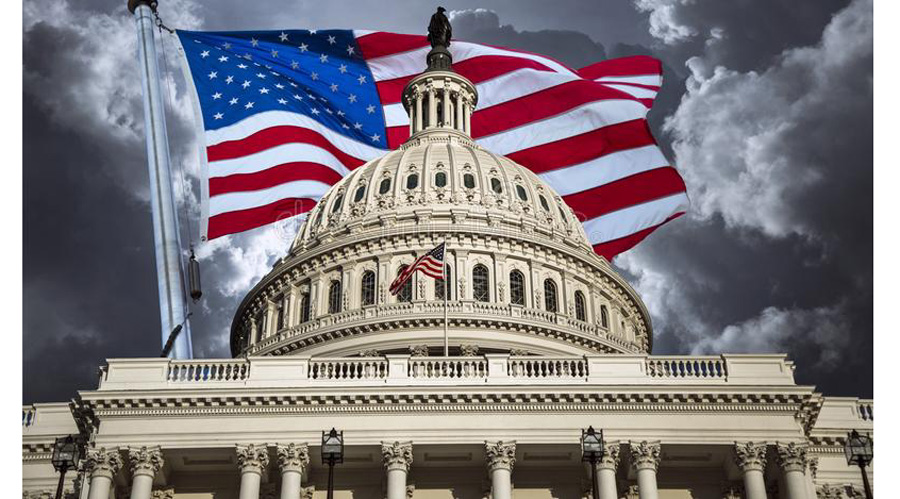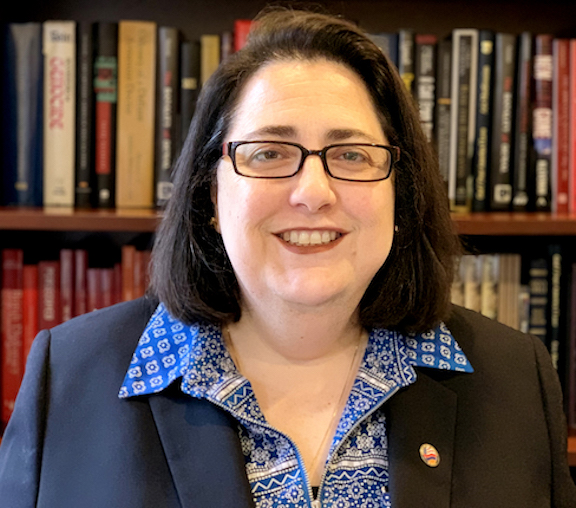Battle to Save U.S. Artsakh Aid Continues: Interview with ANCA Communications Director Elizabeth Chouldjian
- (0)

Over the pasts several weeks, news reports claiming the end of U.S. assistance to Artsakh have been circulating, leading to all sorts of speculation about the demise of life-saving programs like The Halo Trust’s de-mining efforts in Artsakh. Asbarez English Editor Ara Khachatourian reached out to ANCA Communications Director Elizabeth Chouldjian (ESC) to get the facts and to see what Armenian Americans can do to continue and expand U.S. support for Artsakh de-mining and other Artsakh humanitarian projects.
Asbarez: Elizabeth, reports are circulating that the State Department has shut down Artsakh aid. What’s the latest?

But, the reality remains – mines continue to put the lives of Artsakh families at risk and cutting aid would mean that the Artsakh people are the only population in the area not to receive humanitarian assistance from the United States. This would undermine confidence in the peace process and, worse yet, reward Azerbaijan for decades of belligerence and attacks against Artsakh and Armenia.
Asbarez: Well, let’s take these arguments to end Artsakh aid one by one – starting with the lack of funds to continue the project and the progress made by The HALO Trust.
ESC: These are perhaps two of the most ludicrous arguments to be made, given how cost-effective Artsakh demining has been over the years as a program overall and in terms of return on investment. The HALO Trust has removed over 250,000 mines, undetonated explosive devices, cluster bombs and rounds of ammunition from Artsakh since it started demining in the Republic in 2001. They have cleared over 11,600 acres of land, impacting the lives of over 130,000 Artsakh residents, ensuring they can farm safely and their children can play in the fields around their homes without fear of explosions where they can lose a hand, or legs, or worse yet, their lives. Over the past several years, the U.S. government has been providing around $1.5 million to $2 million a year to continue the project – a drop in the bucket compared to the $100 million in military assistance announced last year for Azerbaijan’s Caspian security initiatives.
The HALO Trust team members offer an update on Artsakh demining efforts to Representative Jackie Speier (D-CA) and Judy Chu (D-CA) as ANCA Government Affairs Director Tereza Yerimyan looks on. Representatives Chu, Speier, and Frank Pallone (D-NJ) traveled to the Republic of Artsakh in October, 2019, to review the progress of U.S. humanitarian assistance to the region.
Artsakh de-mining – and the other humanitarian projects like supporting maternal health and getting clean water to villages, all Congressionally mandated since the ANCA began advocating for Artsakh aid back in 1997 – have been the investment in regional stability needed to bolster the peace process and ensure that people of Artsakh are not forsaken in the face of Azerbaijani political pressure and threats.
Asbarez: That’s a lot of area covered by The HALO Trust already. How close are we to getting Artsakh mine-free?
ESC: That’s an excellent question – the answer to which lies in The HALO Trust’s ability to continue to survey areas that have not yet been de-mined, identify what’s needed in those areas, and then get to work to de=mine them safely. According to The HALO Trust, they are currently looking to survey at least another 11.8 million square meters in the Martakert region – and without that being completed, we won’t know what’s really out there. More than that, The HALO Trust is reporting that just in last year or so, there have been about a dozen near-misses reported – situations where farmers have come upon unexploded mines, and by the grace of God, they have not been triggered, and have been removed safely. How many more of those situations are out there? How many families and lives can be ruined because the program is cut short after decades of systematic and meticulous efforts by The HALO Trust’s local de-mining teams?
Asbarez: Well, what about the need to re-route the funds for Armenia democracy assistance or preparing the populations for peace?
ESC: The U.S. has provided over $2.5 billion in U.S. assistance to Armenia over the past three decades – funds which the ANCA has advocated for vigorously on an annual basis as Congress drafted and adopted its annual foreign aid budgets. Cutting Artsakh aid to increase aid to Armenia is a false choice – unfairly victimizing a vulnerable, blockaded population, and unnecessarily risking their lives in the face of increased threats and cross-border attacks from Azerbaijan.
Children from Maratuk village play in front of their school in Tsaghkaberd village. The road between the two villages was heavily mined until it was cleared by The HALO Trust. Photo Credit: The HALO Trust
As for “preparing populations for peace” and bolstering the ongoing peace process – Artsakh and Armenia have been at the forefront of taking demonstrable steps to ensure peace in the region. Take for example the ANCA-supported Royce-Engel proposals, including the removal of snipers from the line of contact with Azerbaijan, supporting an increase in Organization for Security and Cooperation (OSCE) monitors on the front lines, and the placement of gunfire locators to identify who is breaking the ceasefire. Armenia and Artsakh have agreed to these common-sense action items. And, yet, despite OSCE support, Azerbaijan remains the only obstacle to its implementation. Now, to reward Azerbaijan by increasing their military assistance and cutting aid to Artsakh only serves to undermine the peace process and embolden an already belligerent President Aliyev to increase its attacks on Armenia and Artsakh. America should not be normalizing Azerbaijani aggression.
Asbarez: So what’s the process to ensure the continuation of aid to Artsakh?
ESC: The U.S. Congress holds the proverbial budgetary “purse-strings” and defines how U.S. foreign assistance will be spent. The ANCA has been working with the Congressional Armenian Caucus and key Senate leaders and Appropriations Committee members from both houses to continue and expand aid to Artsakh. Back in August of 2019, over 100 Senators and Representatives called on the White House and State Department to continue de-mining assistance to Artsakh. Just last week, over 75 U.S. House members called on the U.S. House Appropriations Committee leadership to include Artsakh aid in the Fiscal Year 2021 Foreign Aid Bill. Over the past month, ANCA has literally been working with over 100 Congressional offices to include Artsakh aid in their annual “asks” for foreign assistance.
The key in all of this has been the Congressional outreach by Armenian Americans across the U.S. asking their Senate and House members to prioritize Artsakh aid. Over 50,000 letters have gone out, thousands of calls made by ANCA Rapid Responders and supporters through our advocacy portals. And we need to keep up the pressure – even in these challenging times – to ensure Artsakh aid priorities are met.
Asbarez: Can Armenian Americans still take action during this COVID-19 epidemic? Is Congress listening?
ESC: There is no question that Members of Congress are working tirelessly to ensure that the American people have the resources to deal with the COVID-19 pandemic. But the behind the scenes work of preparing the Fiscal Year 2021 foreign aid bill – as well as all the other appropriations bills – continues. Our ANCA team has been working with the State Department, with Congressional offices – remotely of course – on a range of issues, with a sharp focus on expanded Artsakh assistance. We’ve been working with key stakeholders like the Embassy of Armenia and the Office of the Artsakh Republic in Washington, DC – each of whom have been doing their part on this issue.
The HALO Trust’s Artsakh Program Manager Rob Syfret offers the ANCA National Board Members Raffi Hamparian and Steve Mesrobian the latest update on their Artsakh demining efforts during a February, 2020, working visit to Artsakh for an international ANCs summit.
And, by the way, the opponents of Artsakh aid – Azerbaijan’s lobbyists, the Azerbaijani Embassies and Consulates – continue to spend millions in lobbying to stop Artsakh aid.
Now is not the time to remain silent. Every Armenian American should be visiting the ANCA action portal – anca.org/aid – and contacting their legislators in support of Artsakh and Armenia assistance.
Asbarez: How long will this process take?
ESC: Well, expect the first drafts of the FY2021 Foreign aid bills, in the Senate and the House, to be presented in the next few months. We are laying the groundwork now to ensure that Artsakh aid is included in those early drafts. However, we will have opportunities to work with Congressional colleagues to offer amendments to those measures – as we have done successfully in the past with the Valadao and Cox Amendments for Artsakh aid in 2017 and 2019 – to include Artsakh assistance. Once the Senate and House versions of the foreign aid bills are finalized, then we need to ensure that the final measure, which is negotiated between the two Houses of Congress, continues to reflect these Artsakh aid priorities. That will take us into the Fall, 2020. At every instance – Armenian American community advocacy and input will be crucial and the ANCA will be sharing information as key milestones are met to ensure our Armenian Americans can weigh in and make their voices heard.
Asbarez: Is de-mining the only ANCA humanitarian aid priority?
ESC: De-mining is an important part of our advocacy efforts for Artsakh but the ANCA has also been calling for an expansion of assistance, specifically to assist regional rehabilitation efforts like those offered by the Lady Cox Rehabilitation Center in Artsakh. In testimony submitted to the House Appropriations Committee in February, ANCA Government Affairs Director Tereza Yerimyan called for $10 million in assistance for Artsakh and $100 million in aid to Armenia. These have been a long-standing advocacy priorities – a cornerstone of the ANCA’s commitment to the safety, security, and freedom of the Armenian homeland. Our full array of advocacy policies, priorities, and results are available in our ANCA 360 publication, available at anca.org/anca360.





















